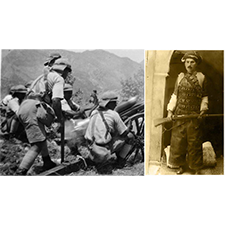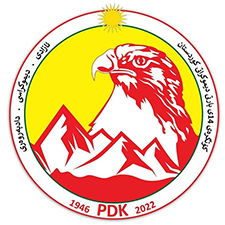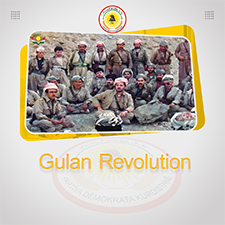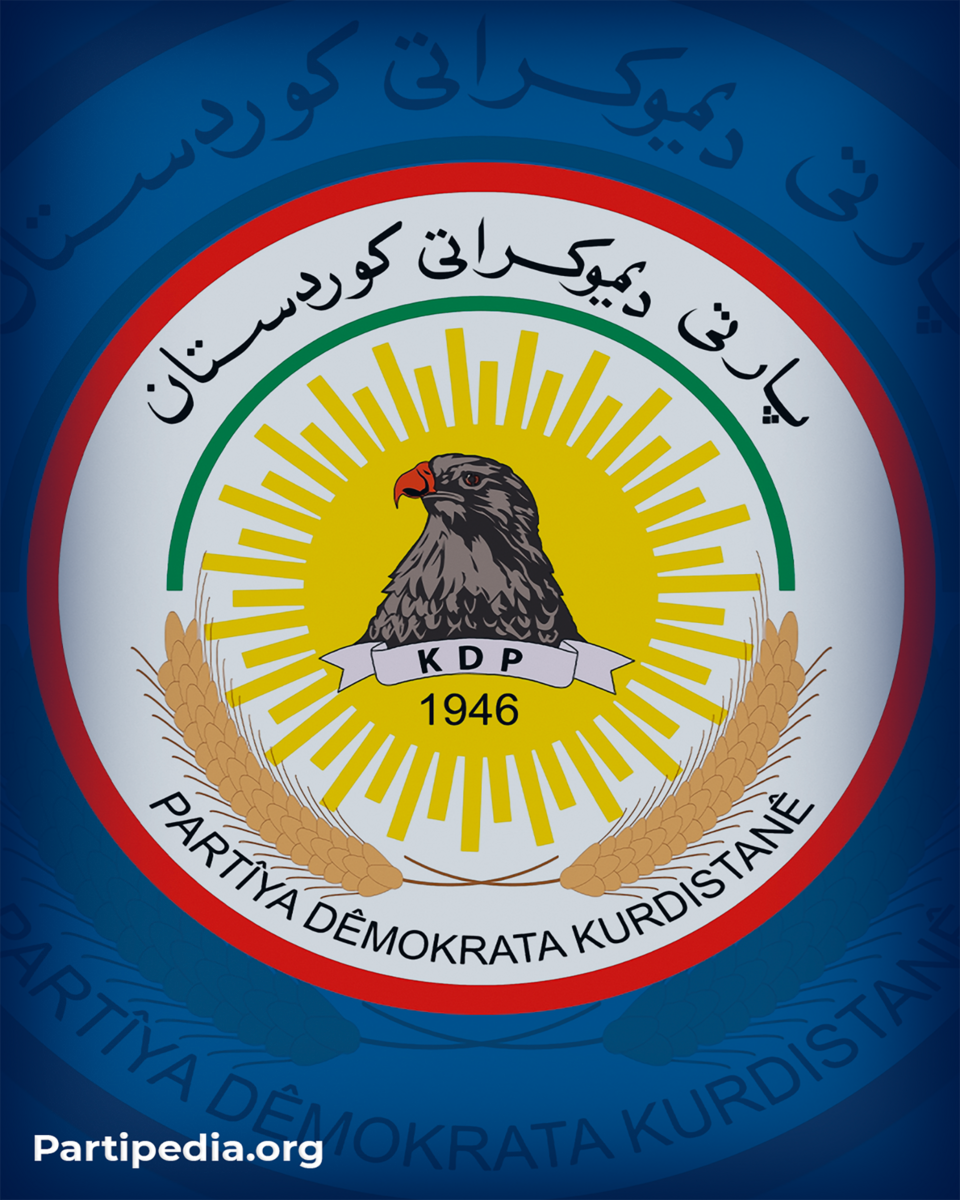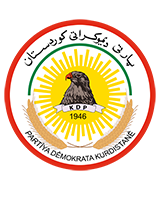In Barzan area in 1931-1932, the first Barzan revolution led by Sheikh Ahmad Barzani was fought between the Barzan forces and the Iraqi government forces with the support of the British forces after many confrontations the government was able to take over the Barzan region and Force the Barzan forces to retreat into the Turkey territory.
The Kurdish issue after World War I (1914-1918), as an important issue in the Middle East the Kurdish issue was the subject of much regional and national struggle, and Barzan area as all the areas of Kurdistan took its share from the problems and struggles. In the late 1914 It became clear to the British government that the Ottoman Empire, an ally of Britain, intended to go to war and was making moves and that Britain wanted to protect its interests against this attitude of the Ottoman Empire.
Sir Stanley Maude and Maudros treaty
Thus Britain occupied the Basrah araea, After three years of war, the Ottoman army lost the control of the war. Britain and Russia were able to occupy parts of Iraq and Iran. In the Treaty of Sykes-Picot in 1916, Mosul state fell to France later Britain was able to convince France to exchange Mosul with the Britain share. Later On March 11, 1917, the British, led by Sir Stanley Maude, were able to occupy Baghdad. On August 30, 1918, after the end of World War I, the Treaty of Maudros allowed Britain to occupy parts of Mosul, Baghdad and Basra and bring the Ottoman Empire to failiure, In November 1918, Sheikh Mahmoud Hafeed was appointed as the civilian leader of the Sulaimani region by order of the British and was given the title of Captain. Sheikh Mahmoud as the representative of Kurds was asking for Kurds’ rights and when in Suleymaniyah area the revolution of sheikh Mahmoud began in May 1919, Sheikh Ahmed sent a Barzan force led by Mustafa Barzani to help Sheikh Mahmoud's revolution and asked the tribal chiefs to help the revolution.
When Sheikh Ahmad, under the command of his brother Mohammed Sadiq, sent a force to defend against the attack on Acre, on November 4, 1919, Colonel Bill and Captain Scott were killed in an ambush after these incidents the British counted Sheikh Ahmed as a major enemy to Britain and started to encourage the Assyrians against the Barzanis, but they were unsuccessful. On March 3, 1920, the San Remo Conference declared Iraq under British rule, later in the decision of League of Nations Iraq became under the Brittish rule which led to the National Revolution in Iraq.
On 25 October 1920, in talks between Sir Persy Cox, the British Semitic envoy, with Abdul Rahman Naqib, it was agreed upon to form the first Iraqi interim government, which consisted of eight ministers and twelve ministers without ministries which did not include any Kurds, on August 23, 1921, King Faisal son of Hussein was appointed king of Iraq. In 1925, the Iraqi government established the first police station in Barzan as a first step to consolidate its power, Sheikh Ahmed Barzani though that this attempt of the government was for the purpose of providing service and giving importance to the area, but the government had another purpose.
The Kurdish Support Group
In 1925, the Sheikh Saeed of Piran Revolution broke out in North Kurdistan. Sheikh Ahmad sent a force led by Mustafa Barzani to help the revolution until its suppression. In 1927, the British Iraqi government launched a military attack against Sheikh Ahmad it was bravely repulsed by the Barzanis, in the same year the government established a military base in the Ble area. During these times the Kurdish Support Group was established and Sheikh Ahmed became the president of the group. On February 31, 1928, the simitic envoy Major Wilson was sent to Sheikh Ahmed to calm the situation.
In this condition, Sheikh Ahmad sent a letter to King Faisal I, calling for a united position of the Kurdish and Arab nations to expel the British from Iraq. Sheikh Ahmad sent his brother Mustafa Barzani to the governor (Mutasarif) of Mosul with the purpose to exchange Ble’s British force with an Iraqi regiment, the governor of Mosul agreed. An Iraqi regiment commanded by Mohammed Barqi replaced the British force in Ble. The British were annoyed by this act of Sheikh Ahmed and start to devise plans.
In April 1931, Sheikh Ahmad called for independence for Kurds from the League of Nations. The British became even angrier with Sheikh Ahmad's attitude, so they began to spread propaganda against the Takya of Barzan and its leader which led to the Bradostis with the British instigation to attack the tribal area of Sherwani tribe and the villages of Garkal, Kolek and Babke twice. The Barzan forces, by Sheikh Ahmad’s command, were first deployed in the summer of 1931 under the leadership of Mustafa Barzani on November 25, 1931.
The second time, under the command of Wli Beg, they were able to defeat the Bradostis attack. In the face of these events, the mayor of Zebar tried to mediate. On December 3, 1931, the mayor of Zebar asked Sheikh Ahmad to send his representative and Sheikh Ahmed sent his brother Mohammed Sadiq with a force At that time, Mustafa Barzani was out of Barzan for another purpose. The government knew that there were only a few people left in Barzan village, so the government decided to attack Barzan.
On December 9, 1931, the Iraqi forces attacked Barzan village from three directions, but Barzan Village defeated the attacking forces by killing 126 soldiers and taking some of them as prisoners, in return Barzan forces had five martyes, trhis battle was known as the battle of Barqi Beg. This resistance was the reason for the outbreak of the first Barzan revolution. After this battle, due to the arrival of winter and the engagement of part of their forces in the second revolution of Sheikh Mahmoud, the government agreed to Sheikh Ahmed's request to cease the fighting until the spring of 1932.
During the ceasefire, the government was able to recruit several Agha and tribal chiefs against the Barzanis and mobilize more forces in the Rawanduz, Akre and Amedi areas. On December 12, 1932, the Council of Ministers decided to attack Barzan. On February 18, 1932, it sent a letter to the Turkish government to prevent the Barzanis from entering Turkish territory, after these actions sheikh Ahmed realizes that the government is willing to reorganize and gathering strength to attack Barzan.
On March 10, 1932, the government sent a message to Sheikh Ahmad asking him to appear before the governor of Zebar (Ble). They gave him only two days to appear and to agree to establish a feudal base in Barzan. Sheikh Ahmed knew about the government’s intent, so he rejected the request, After the request was rejected, the government launched an infantry attack from three sides with the support of the British Air Force. In preparation for the defence, the Barzani forces were divided into three fronts.
The Mergasur-Sherwan front led by Mustafa Barzani, the Balenda-Amedi front led by Mohammed Sadiq and his assistant Haji Taha Akreyi, and a force led by Sheikh Ahmad remained in Barzan. On March 18, 1932, the first clash between the two fronts took place in Korke, where the government forces were defeated and retreated to Mergasor. On April 3, 1932, the Battle of Dola Vazhe took place with the participation of the Dai force against the Barzan forces from the Mergasur side to the Vazhe and Mamisk Valley, the government force casualties in this battle reached 253 killed and wounded and imprisonment of a number of the government soldiers. In this battle Barzan’s Army had 13 martyrs 34 wounded, after the defeat of the Iraqi army, the British air force bombed the Barzan area from all sides. On April 27, 1932, a British plane crashed after being aimed by the Barzanis, the pilot and his assistant arrested in Sherwan Mazin.
Sheikh Ahmed requested to send a doctor to treat the prisoners. On May 3, 1932, Captain Holt, accompanied by a doctor and a linguist, arrived at Sheikh Ahmed’s place. Sheikh Ahmed and Captain Holt discussed about the government's attack, they reach an agreement on freeing 25 barzanis whom Sadiq Agha Oremari on the Amedi front handed them over to the government in exchange for the release of the pilot and his assistant.
In late May 1932, Sheikh Nuruddin Brifkani visited Sheikh Ahmed and conveyed the government's demand. The government's condition was that dialogues be held in the village of Hostan near an Iraqi regiment. Sheikh Ahmed rejected the condition, because of distrust to the British government, two days after the return of Sheikh Nuraddin Brifkani British air strikes began intensively, causing villagers to flee to caves and evacuate villages. These attacks destroyed 79 villages and burned and collapsed 1,365 houses. After this unstable condition Sheikh Ahmed on June 1, 1932, met with prominent men such as and Wli Beg, Khalil Khoshawi, Ahmed Nader, Abdullah Kirkemoyi, Hassan Mohammed Amin to discuss the situation of the region. It was decided to retreat to Turkey. On June 10, 1932, all the families gathered in the Zet Valley and surrounding villages and prepared to enter Turkey’s territory. Before leaving, however, Sheikh Ahmed held another meeting with prominent men and some decisions were made, including that as few families as possible enter Turkey, those who are not in danger return to their villages and hand over some weapons to the government, about 200 to 300 people under the command of Khalil Khoshawi, Ahmad Nader, Abdullah Kirkemoyi and Hassan Mohammed Amin to remain on the border between Gardian villages with additional weapons for the necessary time and continue the armed movement and protect the displaced families until they escape into Turkey.
On June 12, 1932, the Pol group with the assistance of the Jashes of Kalhe Rekani assaulted the Mizzori area and failed, on June 15, 1932 the Iraqi army advanced to Sherwan Mazen. On June 19-20, 1932, the Iraqi army attacked the Zet Valley and was defeated they had 75 dead casualties. On June 20, 1932, Mohammed Sadiq and Haji Taha Akreyi were sent to the village of Grana to negotiate with the Turkish government authorities to arrange for the Barzani families to enter Turkey, and the government agreed on condition that they hand over their weapons. On June 21, 1932, the Barzanis entered Turkish territory. On June 22, 1932, Sheikh Ahmed entered Turkey’s territory. Their retreat ended the First Barzan Revolution, but the armed movement continued after they entered Turkish territory Sheikh Ahmed, Haji Taha Akreyi and Ali Mah Barzani were transferred to Ankara, Mustafa Barzani and Mohammed Sadiq to Erzurum.
After the Barzanis went to Turkey, the Iraqi government forced its supremacy in Barzan area and established several police and military bases in the area. The clashes subsided until the spring of 1933, when a tripartite treaty was signed between Turkey, Iraq and the British, The Turkey government handed Sheikh Ahmed over to the Iraqi government, this dismayed the people of Barzan they left the Turkish land and returned to Barzan, After the return of the Barzanis in late August 1933, the Iraqi government feared that the Barzanis would resume the revolution. So they released Sheikh Ahmad. In exchange for his release, he promised the government to send Mustafa Barzani to Mosul. In return, the government decided to grant a general amnesty to the Barzanis except Khalil Khoshawi.
After a short period, Sheikh Ahmad was summoned to Mosul. After Sheikh Ahmad left, he sent an envoy from Mosul to Barzan to summon Mustafa Barzani. After Mustafa Barzani's departure, they were both arrested and Mohammed Sadiq, Babo, and Sheikh Salam’s children invited all their families to Mosul, and later they were transferred to southern Iraq. After receiving these news, Khalil Khoshawi, Ahmad Nader and Abdullah Kirkamoyi, acted as the leaders of the Barzan armed movement who had remained in the region after the first Barzan revolution, took refuge the heights, the repeated clashes until the martyrdom of Ahmed Nader in September 1935, the martyrdom of Khalil Khoshawi in February 1936, thus the First Barzan Revolution was suppressed until after the return of Mullah Mustafa Barzani in 1943.
Sources:
مستهفا محهمهد كهریم، پێشهاته سیاسییهكانی دهڤهری بارزان له ماوهی ساڵانی(١٩٠٢- ١٩٣٢)، (ههولێر-چاپخانهی رۆكسانا-٢٠٢٢)،ل١٣٦-١٨٢.
مهسعود بارزانی، بارزانی و بزووتنهوهی رزگاریخوازی كورد(١٩٣١- ١٩٥٨)، بهرگی یهكهم، چاپی دووهم،ل٢٤-٥٤.
عبدالعزيز العقيلي, تاريخ حركات بارزان الاولى عام ١٩٣٢, (بغداد-مطبعة الشباب-١٩٥٦).
بههرام وهلهد بهگی، شۆڕشهكانی بارزان شێخ ئهحمهد له بهڵگهنامهكانی ئێران دا(١٩٠٩-١٩٧٠)، بهرگی یهكهم، (تاران-چاپخانهی سازمان چاپ ئهحمهدی-٢٠٢١)،ل١٠٩-١٦١.




